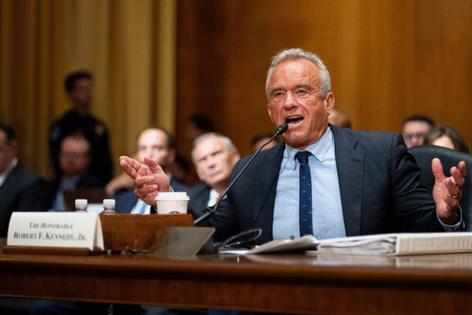'Make America Healthy Again' movement, Minnesota farm groups in fight over pesticides
Published in Business News
The “Make America Healthy Again” movement and American agriculture have been on a collision course this year, and at the center is a fight over commonly used pesticides.
This May, a MAHA Commission led by Health and Human Services Secretary Robert F. Kennedy Jr. named some pesticides as potentially problematic, citing studies that link these chemicals to cancers and reproductive issues.
Then in September, the commission released a strategy report that backed away from some earlier claims about pesticides. Ag groups like Minnesota Corn hailed the second publication, saying in a statement that growers had lobbied the federal government to defend the chemicals.
Here’s why the battle between health activists and farm groups isn’t over.
“Make America Healthy Again” is a slogan popularized by Kennedy, an environmental lawyer, during his unsuccessful presidential run in 2024. Kennedy chairs the MAHA Commission, which includes several federal agencies. Separately, a constellation of online advocates associate themselves with a MAHA movement aimed at improving Americans’ health.
The movement targets a spectrum of forces they believe are causing illnesses. In some cases — like opposition to fluoride in drinking water — the evidence of damage is lacking.
In the case of some commonly used pesticides, however, “there is a wealth of information that says they have effects,” said Linda Birnbaum, the former director of the National Institute for Environmental Health Sciences and National Toxicology Program.
Of the group of pesticides that MAHA often mentions, glyphosate is the most commonly used in Minnesota and around the world. It’s the active ingredient in Roundup weed killer, introduced by the U.S. company Monsanto in 1975.
It’s a systemic herbicide, which means it’s designed to kill all sorts of plants — but crop seeds have been specifically bred to be resistant to the chemicals. In Minnesota, glyphosate is commonly used in row-crop fields, with 16.4 million pounds of glyphosate sold in 2023, according to the Minnesota Department of Agriculture.
Over the years, the chemical has become less effective at killing a broad group of weeds as plants evolve. Gary Prescher, an agronomist and corn and soy farmer near Blue Earth, said he now uses the chemical in a mix with others when he sprays his field.
The International Agency for Research on Cancer, part of the World Health Organization, has concluded the chemical is “probably” a carcinogen. In reviews of scientific literature, it’s most commonly linked with Non-Hodgkin lymphoma.
However, the Environmental Protection Agency has declined to include cancer warnings on glyphosate labels, based on its own review of industry studies.
Boise State University researcher Cynthia Curl said glyphosate is safer than some other pesticides on the market. But because some recent studies have also linked it with reproductive issues, like preterm births, more research should be done on that potential harm, Curl said.
Bayer, which bought Monsanto in 2018, said in a statement that it stands behind the safety of glyphosate-based products.
The company has paid approximately $11 billion to settle thousands of glyphosate lawsuits, which often claim pesticide labels failed to warn users about health risks. Bayer still faces about 61,000 claims related to the chemical.
Many farmers see glyphosate as a crucial weed-fighting tool. Darin Johnson, president of the Minnesota Soybean Growers Association, said that it’s a broadly effective pesticide “that fits most farms across the board.”
These days, glyphosate works best to control grasses, and some broadleaf weeds like waterhemp, Johnson said.
Prescher said he uses glyphosate less often than he did when it was first introduced, when it seemed to work like “a silver bullet” to control unwanted plants.
In recent years, bills have been introduced in several state legislatures, and passed in North Dakota and Georgia, that would limit lawsuits against Bayer and other chemical manufacturers for failing to warn about pesticides’ harms.
This year, a provision added to a GOP spending bill in Congress would have also restricted changes to pesticide labels and, opponents say, undermine lawsuits against pesticide makers.
Kelly Ryerson, a California MAHA advocate who posts online under the name the Glyphosate Girl, repeatedly urged her followers to call lawmakers and oppose the provision. It’s stalled for now but Ryerson expects it to resurface.
“It gets the companies off the hook, because then the companies can say, ‘Well, we knew it might cause a problem, but because the EPA couldn’t update the label, it’s not our fault,’” Ryerson said.
Bayer said in a statement that the federal language would not actually stop any lawsuits against the company, but that it would stop label changes that are contrary to federal law.
Bayer has already stopped including glyphosate in some Roundup formulations that are sold to household users. But the company has also indicated it may stop selling the chemical to farmers, with CEO Bill Anderson telling the Wall Street Journal this April that “we’re pretty much reaching the end of the road.”
If Bayer stopped selling pesticides with the chemical in the United States, that would be “absolutely devastating, because if you pull something like that off the shelf, what’s next?” Johnson said.
Prescher was less worried because Bayer no longer holds a patent, so farmers could still buy glyphosate from other sources. And, he said, “We don’t rely on it like we did 15, 20 years ago.”
_____
©2025 The Minnesota Star Tribune. Visit startribune.com. Distributed by Tribune Content Agency, LLC












Comments